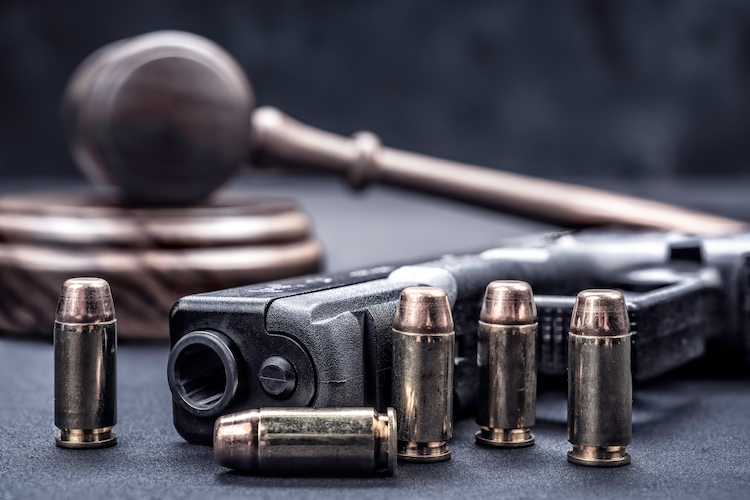
In State v. Kyle A. Smart (A-6-22/087315) (Decided March 8, 2023), the Supreme Court of New Jersey held that the automobile exception to the warrant requirement, as set forth in State v. Witt, 223 N.J. 409 (2015), did not permit the warrantless search of defendant Kyle Smart’s vehicle after an investigative stop because the police actions giving rise to probable cause to search the vehicle were not prompted by circumstances that were “unforeseeable and spontaneous.”
Facts of State v. Smart
On August 4, 2021, Officer Louis Taranto commenced surveillance in front of a condominium complex located in an area where frequent narcotics transactions and other criminal activity occurred. Based on information received a month earlier from a confidential informant (CI), Taranto identified a 2017 GMC Terrain parked at the complex as a used by a drug dealer known as “Killer.” Taranto conducted a database search and learned defendant had been listed with the moniker “Killer” and had multiple arrests and felony convictions involving controlled dangerous substances.
While Taranto was surveilling the GMC, he observed a female (the driver), defendant, and a child enter the GMC and followed them to a residence where he saw activity consistent with a drug transaction. At some point, Officer Samantha Sutter followed the GMC to the residence. Sutter knew that multiple drug users lived there. Indeed, two months earlier, a concerned citizen had notified Sutter that drug activity may have occurred at the residence. Taranto and Sutter reasonably suspected that defendant had previously engaged in drug deals at the residence.
The officers’ suspicions were bolstered when Sutter observed defendant exit the GMC and walk towards the backyard of the residence. Sutter was briefly unable to see defendant. Defendant returned from the backyard, accompanied by an unidentified female; he then entered the GMC while the unidentified female returned to the residence.
Considering the information from the CI and the concerned citizen, Taranto’s investigation, and the surveillance by Taranto and Sutter, Officers Taranto and Sutter determined they had reasonable and articulable suspicion to perform an investigative stop. After pulling over the GMC, Taranto patted defendant down, finding no incriminating evidence. After the defendant refused consent to search the vehicle, the police action continued by calling a canine unit to conduct a dog sniff to establish probable cause. The canine performed an exterior sniff and detected the presence of drugs. Thereafter, officers immediately conducted a warrantless search.
The trial judge determined the circumstances were not “unforeseeable and spontaneous” as required under Witt, concluded a warrant was required, and suppressed the evidence seized from the vehicle. The Appellate Division affirmed.
NJ Supreme Court’s Decision in State v. Smart
The New Jersey Supreme Court affirmed the order suppressing the physical evidence seized from the vehicle. “We hold that the circumstances giving rise to probable cause were not ‘unforeseeable and spontaneous,’” the court wrote. “Those circumstances included investigating previous information from the CI and concerned citizen about defendant, the vehicle, and narcotics trafficking in the area; lengthy surveillance of defendant and the vehicle; reasonable and articulable suspicion that defendant had engaged in a drug deal; and a positive canine sniff of the vehicle.”
As the New Jersey Supreme Court explained, the automobile exception to the warrant requirement differs under state and federal law. In State v. Alston, 88 N.J. 211 (1981), the New Jersey Supreme Court applied federal constitutional law and concluded that “the exigent circumstances that justify the invocation of the automobile exception are the unforeseeability and spontaneity of the circumstances giving rise to probable cause, . . . and the inherent mobility of the automobile stopped on the highway.”
While the U.S. Supreme Court subsequently held that probable cause to believe a car contains contraband “alone satisfies the automobile exception to the Fourth Amendment’s warrant requirement,” the New Jersey Supreme Court affirmed in Witt that the New Jersey Constitution offers greater protection than the Fourth Amendment with regard to the automobile exception through the extra requirement that the circumstances giving rise to probable cause be “unforeseeable and spontaneous” — in addition to the inherent mobility of the automobile stopped on a roadway. The New Jersey Supreme Court applied the above “unforeseeable and spontaneous” requirement to the facts of the case and determined that the exact opposite occurred. “The investigative stop was deliberate, orchestrated, and wholly connected with the reason for the subsequent seizure of the evidence … A warrant was required before searching the GMC,” the court explained. The New Jersey Supreme Court further noted that the question of whether the circumstances giving rise to probable cause were unforeseeable and spontaneous is a fact-sensitive inquiry that should be analyzed case by case.

In Statewide Insurance Fund v. Star Insurance Company (A-62-21/086440) (Decided February 16, 2023), the Supreme Court of New Jersey held that a public entity joint insurance fund (JIF) established under the Joint Insurance Fund Act affords liability protection to public entities through “self-insurance,” not insurance. Accordingly, the “other insurance” clause of the city of Long Branch’s policy with Star Insurance Company (Star) was not triggered because “self-insurance” protection through JIF membership is not “other insurance.”
Facts of Statewide Insurance Fund v. Star Insurance Company
The insurance dispute arose from a tragic accident on a Long Branch beach that claimed the life of a 12-year-old boy. The boy’s parents filed a negligence action against Long Branch, Long Branch Beach Patrol, and seasonal beach police officers who were responsible for patrolling the area. Following settlement of the underlying negligence action, a coverage issue arose as to the primacy of coverage between Star and the JIF.
At the time of the accident, Long Branch took various measures to protect itself from liability. Long Branch joined the Statewide Insurance Fund and purchased a commercial general liability policy from Star. As a member of the Fund, Long Branch was entitled to receive $10 million in liability coverage per occurrence. The Fund’s contracting document contains a clause limiting recovery from the Fund to liability in excess over other “insurance or self-insurance” coverage.
Under the Star policy, Long Branch had $10 million in liability insurance coverage, excess to a $1 million self-insured retention (SIR). The parties agreed that Star’s insurance coverage is excess only over “other insurance.” However, they disputed who had the primary responsibility to pay the remaining settlement amount. The trial judge concluded that membership in the Fund did not trigger Star’s “other insurance” clause and that Star had the primary responsibility, and the Appellate Division affirmed.
NJ Supreme Court Decision in Statewide Insurance Fund v. Star Insurance Company
The New Jersey Supreme Court unanimously affirmed, holding that that Star’s “other insurance” clause was not triggered because “self- insurance” protection through JIF membership is not “other insurance.” Accordingly, it further found that Star’s coverage was primary.
The New Jersey Supreme Court first addressed the nature of a JIF and the liability protection it provides. In its analysis, the court noted that the JIF Act expressly distinguishes JIFs from insurance companies and exempts them from regulatory provisions in Code sections devoted to insurance. It also found that the general differences in risk allocation between JIFs and commercial general liability carriers reinforced the conclusion that JIF members are self-insured. As Justice Douglas M. Fasciale explained in the court’s opinion:
We hold that a JIF established under N.J.S.A. 40A:10-36 affords liability protection to public entities through “self-insurance.” Under the plain language of N.J.S.A. 40A:10-48, a JIF “is not an insurance company or an insurer under the laws of this State” and its “authorized activities . . . do not constitute the transaction of insurance nor doing an insurance business.” By the statute’s plain terms, JIFs cannot provide insurance in exchange for premiums, as insurance companies typically do; instead, JIF members reduce insurance costs by pooling financial resources, distributing and retaining risk, and paying claims through member assessments. Therefore, JIFs protect members against liability through “self-insurance.” “Self-insurance” is not insurance.
Because it found that the JIF’s coverage was not “insurance,” the New Jersey Supreme Court further concluded that Star’s coverage was primary. “Because ‘self-insurance’ is not the same as ‘insurance’ under the law, and because membership in the Fund protects against liability claims through self-insurance rather than by insurance through an authorized carrier, Star’s ‘other insurance’ clause is not triggered,” the court explained.

In State v. Timothy J. Canfield (A-53-21/086644) (Decided January 11, 2023), the Supreme Court of New Jersey held that the trial court did not err in failing to instruct the jury to consider a lesser charge of passion/provocation manslaughter. However, it declined to adopt a procedural rule proposed by the Appellate Division that would have required that the appropriateness of a passion/provocation manslaughter instruction be considered first by the trial court.
Facts of State v. Canfield
In January 2013, defendant Timothy J. Canfield shot and killed K.P., his sister-in-law’s former boyfriend. Defendant claimed that he acted in self-defense. He testified that K.P., who was HIV-positive, came towards him during their argument while holding an object that defendant believed to be a hypodermic syringe. Defendant was charged with first-degree murder.
At the charge conference, defendant objected to giving any instruction on lesser-included offenses, but the trial court charged the jury on aggravated and reckless manslaughter. Defendant did not request an instruction on passion/ provocation manslaughter, and the court did not instruct the jury, sua sponte, on that lesser-included offense. The jury acquitted defendant of murder but convicted him of the lesser-included offense of aggravated manslaughter, among other offenses.
The Appellate Division held that it was not plain error for the trial court not to give the passion/provocation manslaughter instruction because even accepting defendant’s version of the fatal confrontation, that instruction was not clearly indicated. However, the appellate court proposed a measure to ensure that the appropriateness of a passion/provocation manslaughter instruction be considered first by the trial court.
The Appellate Division recommended a new procedural rule: “when, in a murder prosecution, the trial court determines to instruct the jury on self-defense at the charge conference . . . , the court should also consider and make specific findings on the record as to whether to instruct the jury on the lesser-included offense of passion/provocation manslaughter, regardless of whether either party has requested that instruction.” To implement its proposed rule, the Appellate Division recommended that the model jury instructions for murder, aggravated manslaughter, manslaughter, and self-defense be reviewed.
NJ Supreme Court Decision in State v. Canfield
The New Jersey Supreme Court affirmed as the Appellate Division’s judgment substantially for the reasons stated in Judge Ronald Susswein’s “thoughtful and thorough opinion.” However, it did not find that the Appellate Division’s proposed procedural rule was necessary.
In its opinion, the New Jersey Supreme Court cited the Appellate Division’s discussion of the different standards that may apply depending on whether the defendant requests a lesser-included offense instruction. As the court explained, f the defendant requests such a charge, the trial court must include it if, viewing the evidence in the light most favorable to the defendant, there is a rational basis in the record for doing so. However, if the defendant does not request a lesser-included offense charge, the instruction is only required if “clearly indicated” by the facts in evidence.
The New Jersey Supreme Court went on to conclude that it was not plain error for the trial court not to give a passion/provocation instruction sua sponte, agreeing that the defendant’s version of the events fails to meet the ‘clearly-indicated’ standard as to have required a jury instruction on passion/provocation manslaughter sua sponte.” The court explained:
As the Appellate Division persuasively detailed, defendant did not testify that he was involved in any previous physical fight with K.P. Ibid. Although he testified he believed that K.P. was holding a syringe, he did not say that K.P. threatened to use the syringe as a weapon, had previously “assaulted anyone with a syringe[,] or had ever explicitly threatened to do so.” According to defendant, K.P. began approaching from thirty feet away. Ibid. Defendant did not testify that K.P. was running at him, was “close enough to have used a syringe as a weapon,” or was “holding the object in his hand as if preparing to strike with it.”
The New Jersey Supreme Court declined to adopt the Appellate Division’s proposed procedural rule. In support, the court cited that the Appellate Division, parties, and amici only cited three published cases in the past three decades in which a jury verdict was reversed because the court’s failure to instruct the jury on passion/provocation manslaughter sua sponte was found to be plain error. “Given the apparent infrequency of such plain errors, we do not view the Appellate Division’s proposed procedural rule to be critical to protecting otherwise valid jury verdicts from reversal,” the court wrote.
The New Jersey Supreme Court also noted that the “clearly indicated” standard was specifically created by appellate courts and is more appropriately a tool of post-verdict and appellate review. “Because we believe the current practice correctly balances the interests of the prosecution, the defense, and the public, we decline to adopt the proposed rule,” the court wrote.

In State v. Deje M. Coviello (A-54-21/086673) (Decided January 19, 2023), the Supreme Court of New Jersey clarified which forum should decide whether a defendant should be relieved of the requirement to install an ignition interlock device (IID). The court held that the sentencing court, and not the Motor Vehicle Commission (MVC), has the appropriate jurisdiction over defendant’s motion for sentencing credit concerning the IID requirement.
Facts of State v. Coviello
In September 2013, defendant Deje M. Coviello was found unconscious in the driver’s seat of a parked car with the engine running and with several open containers of alcoholic beverages on the passenger seat. She was arrested and pled guilty to disorderly conduct and driving while intoxicated (DWI).
The defendant’s DWI conviction was her second. It included a two-year period of driver’s license forfeiture, as well as a two-year period of breath alcohol IID installation to commence after completion of the license forfeiture. Defendant never installed an IID, maintaining she did not do so because she could not afford to buy or lease a car and had no access to drive another person’s vehicle.
Nearly five years after her sentencing, in January 2019, defendant moved before the Criminal Part for a credit on her sentence pursuant to Rule 7:9-4. At such time, defendant had fulfilled her entire sentence, including the two-year period of license revocation, except for the IID installation requirement. In her motion, defendant certified that since the date she surrendered her driver’s license for revocation in 2014, she had not owned, leased, or operated a motor vehicle in which an IID could have been installed. Her motion sought to have the court deem her sentence completed, so that she could apply for a driver’s license with the MVC.
The Criminal Part judge denied her motion, finding that the court lacked jurisdiction to hear defendant’s application for relief from the IID requirement and that the MVC was the appropriate forum in which to seek that sentencing relief. The Appellate Division affirmed, holding that defendant’s requested modification of the IID requirement was not “a sentencing issue,” but rather an “administrative” matter for the MVC.
NJ Supreme Court’s Decision in State v. Coviello
The New Jersey Supreme Court reversed. It held that the sentencing court, and not the MVC, has the appropriate jurisdiction over defendant’s motion for sentencing credit concerning the IID requirement. “That conclusion is supported by well-established sentencing principles and the text and structure of the drunk driving statutes,” Judge Sabatino wrote.
In reversing the lower court, the New Jersey Supreme Court emphasized that sentencing is a core function of the Judiciary. In contrast, administrative agencies in the Executive Branch are tasked with ensuring that the terms of sentence imposed by the courts are carried out.
The New Jersey Supreme Court went on to conclude that the nature of the defendant’s request concerning her sentence inherently called for a judicial determination. “Fundamentally, defendant is seeking a declaratory ruling that the years she lacked access to a vehicle, and was thus unable to install an IID, justify up to an equivalent period of relief from her sentence,” Judge Sabatino explained. “Courts are well equipped to render declaratory rulings that involve such matters of status under the law.”
In further support of its decision, the New Jersey Supreme Court cited the MVC’s legal position, as articulated by the Attorney General, that it lacks jurisdiction to hear defendant’s motion. According to the Attorney General, the MVC’s function is “ministerial in nature,” when determining whether defendants have completed all of the steps necessary to have their licenses restored in compliance with the court’s sentence. The New Jersey Supreme Court only addressed the jurisdictional issue. Accordingly, it remanded the case back to the sentencing court to consider the merits of the defendant’s motion.

In State v. Terrell M. Chambers (A-35-21/086317) (Decided January 23, 2023), the Supreme Court of New Jersey addressed when defendants should be able to access a rape victim’s mental health records. The court ultimately held that a heightened discovery standard should govern a defendant’s motion for pre-incident mental health records from a sexual assault victim and established both a formal and informal process to obtain such records.
Facts of State v. Chambers
Defendant Terrell M. Chambers was indicted and charged with second-degree sexual assault, N.J.S.A. 2C:14-2(c)(1), following a victim’s allegation that he performed non-consensual oral sex upon her several times over the course of a night when they drank alcohol at a gathering with friends and family.
In response to the allegations, defendant and several witnesses spoke about the victim’s alleged pre-incident mental illness. Defendant stated that the victim “was in the psychiatric home before, she went crazy before,” implying that she suffered from an illness that impaired her ability to recount the incident, or at a minimum, that she imagined or fabricated the incident. Defendant’s sister stated that the victim “is suicidal” and that “something went wrong with background” when the victim wanted to become a law enforcement officer. The sister’s boyfriend likewise stated that the victim “has been suicidal for a while” and could not become an officer because of “some suicidal things she had on her record.”
Defense counsel filed a motion to compel the State to obtain and produce the victim’s pre-incident mental health records. Alternatively, counsel requested that the State make such records available for an in camera inspection. The State opposed the motion and argued it was not in possession, custody, or control of the records, and that it was without knowledge of their existence.
The judge granted defendant’s motion and ordered the State to obtain and produce, for an in camera inspection, the victim’s mental health records — extending six months before the incident and six months after the incident. The judge accepted defense counsel’s argument that “[t]he possibility of mistaken perception or recollection of an incident presents a legitimate need for the information which outweighs any possible prejudice.” The victim had no notice of the motion and therefore had no opportunity to be heard.
The Appellate Division denied the State’s emergent motion seeking leave to appeal and a stay, noting that the State could renew its motion after the judge “issues an order regarding the use of the victim’s psychiatric records” following the in camera inspection.
NJ Supreme Court’s Decision in State v. Chambers
The New Jersey Supreme Court unanimously agreed that a heightened discovery standard governs a defendant’s motion for pre-incident mental health records from a sexual assault victim. The Court went on to establish a new standard applicable to a formally filed motion and also outlined a less formal process through which defendants may make requests for discovery of the pre- incident mental health records of an alleged sexual assault victim by letter to the prosecutor’s office.
In reaching its decision, the court emphasized the importance of balancing the victim’s highly confidential and privileged communications and the defendant’s important right to present a meaningful defense. Under its framework, a defendant is entitled to present a meaningful defense by making a good-faith request for pre-incident mental health records of a sexual assault victim. A defendant can make a motion seeking that information, follow a less formal path exploring access to the records, or both.
If a defendant files a motion seeking access to pre-incident mental health records, a victim is entitled to notice by the county prosecutor’s office and must have an opportunity to be heard, with or without independent counsel. In addition to the notice requirement, a motion for discovery of mental health records must satisfy the following two-stage standard, as described by the court:
First, to be entitled to an in camera inspection of those records, a defendant must preliminarily demonstrate by a preponderance of the evidence, (1) a substantial, particularized need for the records; (2) that the alleged mental illness is both relevant and material to a victim’s ability to perceive, recall, or recount the alleged assault, or a proclivity to imagine or fabricate it; and (3) that the information sought cannot be obtained through less intrusive means. Second, if a defendant satisfies that heavy preliminary burden after appropriate notice to the victim as we later describe, the judge must conduct an in camera inspection and determine whether to “pierce” the privilege, redact the records, and produce them under a protective order.
The New Jersey Supreme Court also established a process should a defendant elect to proceed informally. As with a formal motion, a victim is still entitled to notice by the county prosecutor’s office and must have an opportunity to be heard with or without independent counsel. To proceed informally, defense counsel can in good faith seek pre-incident mental health records by sending a letter to an assistant prosecutor. The letter should (1) identify with particularity the kinds of records sought; (2) show substantial need tied directly to the victim’s ability to perceive, recall, or recount the facts of the alleged incident, or to the victim’s likelihood to fabricate or even imagine the incident altogether; and (3) explicitly state that sexual assault victims have a statutory right not to “participate in any investigation of the assault.” Because it established a new procedural and analytical framework, the court vacated the order directing the State to produce the victim’s purported records and remanded the case back to the lower court for further proceedings consistent with its opinion.

In W.S. v. Derek Hildreth (A-46-21/086633) (Decided January 18, 2023), the Supreme Court of New Jersey held that child sexual abuse survivors who file a Child Sexual Abuse Act (CSAA) complaint against a public entity after December 1, 2019 — even if their cause of action accrued much earlier — are not required to file a TCA notice of claim before filing suit. In support of its decision, the court cited the “plain meaning” of N.J.S.A. 59:8-3(b).
Facts of W.S. v. Hildreth
W.S. alleged that defendant Derek Hildreth, a teacher at Myron L. Powell Elementary School, sexually assaulted him during the 1996-1997 school year when plaintiff was in sixth grade. Both parties agree that plaintiff’s claim accrued in 2016, when W.S. was about thirty years old. In January 2017, W.S. moved for leave to file a late notice of tort claim, but was denied.
On December 1, 2019, several amendments to the CSAA, Charitable Immunity Act (CIA), and Tort Claims Act (TCA) went into effect. The Legislature extended the statute of limitations for any injury resulting from certain offenses including child sexual abuse to “37 years after the minor reaches the age of majority, or within seven years from the date of reasonable discovery of the injury . . . , whichever date is later,” and it explicitly made the amendment retroactive. Additionally, N.J.S.A. 59:8-3(b) was amended to provide that the “procedural requirements” of the TCA “shall not apply to an action at law for an injury resulting” from sexual abuse. The Legislature also narrowed the scope of substantive immunity under the TCA to exclude “an action at law for damages” resulting from sexual abuse under certain circumstances and specified that the new statute of limitations would apply to any such action at law against a public entity that had not been finally adjudicated as of December 1, 2019.
Approximately one month after the amendments went into effect, W.S. filed suit against Hildreth, the Lawrence Township School District, and others, bringing claims under the CSAA and Law Against Discrimination, as well as numerous common law claims. Defendants moved to dismiss the complaint for failure to file a notice of claim within ninety days of the claim’s accrual as required by N.J.S.A. 59:8-8. The motion judge denied the motion, finding that the amended TCA “applies to causes of action that were not finally adjudicated as of December 1, 2019” and that “plaintiff’s cause of action was not finally adjudicated as of” that date because it was denied without prejudice.
The Appellate Division affirmed, holding that plaintiff’s complaint was filed after the amendments became effective and was therefore “subject to the newly enacted N.J.S.A. 59:8-3(b), which specifically eliminated the need to file a notice of claim in advance of filing suit.” The appeals court further found that “plaintiff never filed ‘a cause of action’ in 2017” because a motion for leave to file a late notice of claim “does not amount to the commencement of ‘civil litigation.’”
NJ Supreme Court’s Decision in W.S. v. Hildreth
The New Jersey Supreme Court unanimously affirmed. “We hold that the plain meaning of the relevant statutes dictates that child sexual abuse survivors who file a CSAA complaint against a public entity after December 1, 2019 — even if their cause of action accrued much earlier — need not file a TCA notice of claim before filing suit,” the court wrote.
The New Jersey Supreme Court first determined that W.S.’s 2017 motion for leave to file a late notice of claim did not commence a civil action and the trial court’s dismissal of the motion without prejudice did not constitute a “final[] adjudicat[ion]” of the case within the meaning of the 2019 amendments. In support, the court cited that a notice of claim under the TCA does not commence civil litigation. Moreover, “[a] motion for permission to file a late notice of claim is even further removed from beginning a lawsuit.”
With regard to the W.S.’s January 2020 complaint, the New Jersey Supreme Court held that the motion judge and the Appellate Division correctly applied the law in effect at that time in denying defendants’ motion to dismiss, and, pursuant to the law in effect at the time W.S. filed his complaint, no notice of claim was required. “Applying the law in effect at the time a complaint is filed — even when that law changed the requirements for filing a complaint — is not applying a statute retroactively; it is applying a statute prospectively to cases filed after its effective date,” the court explained.
The New Jersey Supreme Court went on to reject the argument that what matters for purposes of N.J.S.A. 59:8- 3(b) is when a cause of action accrued, noting that the language of the statute indicates otherwise. The Court further found that none of the other statutes cited by the defendants define the term “action at law” to mean when a cause of action accrues rather than when a complaint is filed in court. Finally, the New Jersey Supreme Court emphasized that the defendants’ interpretation would lead to absurd results. “[I]n defendants’ view, only those subjected to sexual abuse by a public entity or employee after December 1, 2019, or whose cause of action for such abuse accrued after December 1, 2019, would be able to pursue justice in court,” the court wrote. “For everyone else, the Legislature would have intentionally resuscitated child sexual abuse claims against public entities or employees that accrued many years before by retroactively extending the statute of limitations until the victim reached the age of fifty-five through N.J.S.A. 2A:14-2a(a)(1), only for the claim to be immediately dismissed because the victim did not file a notice of claim within ninety days of the cause of action originally accruing. That would be senseless.”

The Supreme Court of New Jersey is poised to consider one of several key criminal law issues that has arisen in the wake of the state’s efforts to expunge low-level marijuana convictions. The key issue before the court in the consolidated cases of State v. Richard Gomes and State v. Moataz M. Sheira is whether a defendant may be admitted into pretrial intervention (PTI) where they have a prior conditional discharge for marijuana charges.
Facts of the Cases
Each of the defendants has a disorderly persons offense for a prior charge for possession of marijuana, which was dismissed via conditional discharge under N.J.S.A. 2C:36A-1. In each case, dismissal occurred following successful completion of a diversionary treatment program.
Pursuant to the conditional discharge statute, placement in supervisory treatment “may occur only once” and a defendant shall not be placed in a conditional discharge program unless a court concludes “[t]he person has not previously received supervisory treatment” under either the PTI statute, the conditional discharge statute, or N.J.S.A. 24:21-27, the predecessor of N.J.S.A. 2C:36A-1.
In 2021, New Jersey enacted the Cannabis Regulatory, Enforcement Assistance, and Marketplace Modernization Act (CREAMMA). Among other cannabis reforms, the law provides that any person who “[p]rior to the effective date” of the statute was in “possession of [fifty] grams or less of marijuana . . . is a disorderly person[.]” With respect to expungements, CREAMMA provides that “any case that, prior to the effective date, includes . . . any disorderly persons offense or petty disorderly persons offense subject to conditional discharge pursuant to N.J.S.[A.] 2C:36A-1, shall be expunged by operation of law, and any remaining sentence, ongoing supervision, or . . . financial assessment . . . shall be vacated by operation of law.”
Following the enactment of CREAMMA, each defendant was arrested on more serious charges and sought admission into the PTI program. Citing Sheira’s prior conditional discharge, a trial court judge determined that he was barred from the program. However, a different judge ruled that Gomes was eligible. Both decisions were appealed, and the Appellate Division consolidated the cases with those of other defendants raising the same issue.
Appellate Division’s Decision
The Appellate Division found that despite CREAMMA, the defendants are still limited to participating in one diversionary program. “CREAMMA did not amend, reference, or supersede the conditional discharge, PTI, or expungement statutes,” the court held.
In reaching its decision, the Appellate Division emphasized that expungement provision in CREAMMA is “neither inconsistent with, nor repugnant to, the Legislature’s earlier enacted rule permitting only one prior diversionary placement, including conditional discharges under [New Jersey Statutes Annotated] 2C:36A-1(c)(3).”
Issues Before the New Jersey Supreme Court
The New Jersey Supreme Court agreed to consider the following question: “Is a defendant with a prior conditional discharge for a disorderly persons offense of marijuana possession eligible for the Pretrial Intervention program if the prior offense was expunged under the Cannabis Regulatory, Enforcement, Assistance and Marketplace Modernization Act?”
In his brief, Sheira argued that CREAMMA’s broad expungement provision “demonstrates the clear legislative intent to eliminate the legal consequences suffered by defendants with low-level marijuana convictions by restoring them to their position prior to the commission of an act that is no longer unlawful.” Meanwhile, Gomes argued that if the Appellate Division’s decision “remains binding on lower courts, it would disqualify a significantly higher proportion of Black PTI applicants than similarly situated white applicants solely because of the discriminatory enforcement of the antiquated law.” Oral arguments were held on January 3, 2023, and a decision is expected in the coming months.

The New Jersey Supreme Court recently announced that it has granted certification in a case challenging the terroristic threats statute, N.J.S.A. 2C:12-3(a), which criminalizes a threat to commit a crime of violence made “in reckless disregard of the risk of causing…terror.” The Appellate Division found the statute to be constitutionally overbroad in violation of the First Amendment.
Facts of the Case
Defendant was charged in a one-count indictment of making terroristic threats within the meaning of “N.J.S.A. 2C:12-3a and/or b.” The indictment was never amended, and defendant never moved for a particularization of what part of N.J.S.A. 2C:12-3 was being charged.
Instead, the matter went to trial and, after two days of testimony, the jury was asked to decide: whether, on May 1, 2015, defendant threatened to commit a crime of violence “with the purpose to terrorize” Officer Sean Healey, or whether he made that threat “in reckless disregard of the risk of causing such terror,” or whether he made that threat “with the purpose to put [Officer Healey] in imminent fear of death” under circumstances reasonably causing Officer Healey “to believe the immediacy of the threat and the likelihood it would be carried out.” The jury responded “guilty” to this multi-faceted question. The Defendant appealed, arguing that the reckless-disregard portion of N.J.S.A. 2C:12-3(a) is unconstitutionally overbroad.
Appellate Division’s Decision
The Appellate Division held that the reckless-disregard portion of N.J.S.A. 2C:12-3(a) is “unconstitutionally overbroad because it has the capacity to criminalize speech and expressions protected by the First Amendment.” According to the Court, “[t]his holding alone requires that defendant be given a new trial since no one can tell from the jury verdict whether defendant was convicted under the unconstitutional portion of N.J.S.A. 2C:12-3(a) or the remaining provisions which clearly pass constitutional muster.”
In reaching its decision, the New Jersey Supreme Court cited Virginia v. Black, 538 U.S. 343, 358-59 (2003), in which the U.S. Supreme Court held that a state can punish threatening speech or expression only when the speaker “means to communicate a serious expression of an intent to commit an act of unlawful violence to a particular individual or group of individuals.” It went on to conclude that Black strongly suggests the “reckless disregard” element in N.J.S.A. 2C:12-3(a) is unconstitutionally overbroad.
“Because N.J.S.A. 2C:12- 3(a) permits a conviction for uttering a threat ‘in reckless disregard of the risk of causing . . . terror,’ it unconstitutionally encompasses speech and expression that do not constitute a ‘true threat’ and, therefore, prohibits the right of free speech guaranteed by the First Amendment,” the court wrote.
Issues Before the NJ Supreme Court
The New Jersey Supreme Court granted certification on November 14, 2022. The justices agreed to consider the following question: “Is the portion of the terroristic threats statute, N.J.S.A. 2C:12-3(a), which criminalizes a threat to commit a crime of violence made ‘in reckless disregard of the risk of causing . . . terror,’ unconstitutionally overbroad and did the jury instructions fail to ensure a unanimous verdict?”

In State in the Interest of E.S. (A-41/42-21/086554) (Decided November 22, 2022), the Supreme Court of New Jersey addressed whether the trial court abused its discretion by choosing to hear the State’s motion to waive family court jurisdiction and prosecute a juvenile defendant as an adult before hearing his motion to suppress the gun seized from him at the time of his arrest. While the New Jersey Supreme Court held that the trial court did not abuse its discretion, it declined to adopt a preference that the Family Part hear suppression motions before waiver motions, holding instead that it is within the discretion of the Family Part to determine its schedule of proceedings and manage its calendar.
Facts of State in the Interest of E.S.
In March 2021, defendant E.S. was arrested and charged as a juvenile with weapons and other offenses that would constitute indictable offenses if committed by an adult. Defense counsel moved to suppress the gun seized from defendant at the time of his arrest. Two weeks later, the State moved to waive family court jurisdiction and transfer the case to the Law Division, Criminal Part, to prosecute E.S. as an adult.
The family court initially decided to hear the suppression motion before the waiver motion but, following the State’s motion for reconsideration, resolved to hear the waiver motion first. The Appellate Division affirmed but expressed a “general preference” for the Family Part to hear suppression motions before waiver motions.
NJ Supreme Court Decision in State in the Interest of E.S.
The New Jersey Supreme Court agreed with the Appellate Division that the trial court did not abuse its discretion in deciding to hear defendant’s waiver motion before considering his suppression motion, and remanded to the family court for further proceedings. However, it declined to adopt a preference that the Family Part hear suppression motions before waiver motions. Holding that it is within the discretion of the Family Part to determine its schedule of proceedings and manage its calendar, the court provided several factors that Family Part judges should take into consideration.
In reaching its decision, the New Jersey Supreme Court emphasized that there are fundamental distinctions between juvenile court and criminal court that render the waiver of jurisdiction by the Family Part a “critically important action determining vitally important statutory rights of the juvenile.” In light of these distinctions, the court has found that due process requires that juveniles receive a hearing, effective assistance of counsel who have access to relevant information, a statement of reasons for the court’s decision, and the opportunity to present evidence and testify. At the same time, the court noted constitutional due process in the juvenile waiver context stops short of constitutional guarantees arising from the question of admissibility of evidence at a trial on the merits, and strict adherence to the rules of evidence is not required at the probable cause hearing.
The New Jersey Supreme Court also highlighted the importance of a trial court’s inherent and necessary right to control its own calendar and the public’s interest in the orderly administration of justice. “Waiver motions fall categorically within the purview of the Family Part,” the court further explained. “Although motions to suppress evidence are not reserved to family court, the Family Part can, like its Criminal Part analog, consider motions to suppress evidence as well.”
In light of the above principles, the New Jersey Supreme Court went on to find that the “order of waiver and suppression proceedings does not touch upon the juvenile’s due process rights to be heard and present evidence.” Accordingly, it held that it is within the Family Part’s sound discretion to decide the order in which it hears suppression and waiver motions.
Nevertheless, the New Jersey Supreme Court advised that, in exercising its discretion, the Family Part should take several factors into consideration, including (1) whether the evidence that the defendant is seeking to suppress, if excluded, would be dispositive of probable cause or have a substantial effect on the case in chief; (2) whether there are co-defendants with suppression motions pending in the Family or Criminal Parts; and (3) judicial efficiency and management of the court’s calendar. “Although we consider those factors to be important in the determination of whether to hear a suppression motion or a waiver motion first, the Family Part may of course consider any additional factors that it finds relevant in exercising its discretion,” the court wrote. “Ultimately, the order of proceedings is left to the Family Part’s sound discretion.” Finally, with regard to the court’s decision to hold a waiver hearing prior to a hearing on the suppression motion in the case before it, the New Jersey Supreme Court found no abuse of discretion in the trial court’s grant of the State’s request to hear the waiver motion first in this matter.

In Nancy L. Holm v. Daniel M. Purdy (A-39-21/086229) (Decided December 13, 2022), the Supreme Court of New Jersey held that N.J.S.A. 34:15-36 imposes a non-waivable duty on insurance brokers to inform new LLC members of the availability of workers’ compensation coverage and the right to elect such coverage. The court further held, however, that the defendant may not be held liable for breach of that duty unless the damages alleged were caused by defendant’s willful, wanton or grossly negligent act of commission or omission.
Facts of Holm v. Purdy
Plaintiff Nancy L. Holm is the administratrix of the estate of her husband, Christopher Friedauer, who died in 2015 after falling at his workplace, Holmdel Nurseries, LLC. As a longtime employee of the family-owned business, Christopher had been covered by workers’ compensation insurance; however, he was no longer covered after he became a member of the LLC in 2012.
Plaintiff claims that defendant Daniel M. Purdy, who served as the insurance broker for Holmdel Nurseries from 2002 to 2015, failed to provide to the LLC the notice mandated by N.J.S.A. 34:15-36, and that Christopher was unaware that he no longer had workers’ compensation coverage in his new role as an LLC member. She alleges that as a result of defendant’s negligence and breach of fiduciary duty, Christopher Friedauer’s dependents were deprived of a workers’ compensation death benefit to which they would have been entitled under N.J.S.A. 34:15-13 had he been covered by workers’ compensation insurance at the time of his death.
N.J.S.A. 34:15-36 provides that the members of LLC who actively perform services on behalf of the LLC are eligible for workers’ compensation coverage if the LLC elects to obtain that coverage for its members. The statute mandates that every application for workers’ compensation insurance include a notice of the availability of workers’ compensation coverage for LLC members and a form by which an LLC may elect such coverage. However, the statute precludes the imposition of liability on an insurance broker based on the LLC’s failure to obtain such workers’ compensation coverage for an LLC member unless the insurance broker “causes damage by a willful, wanton or grossly negligent act of commission or omission.”
The trial court ruled that in light of Holmdel Nurseries’ previous decision not to purchase workers’ compensation insurance coverage for its LLC members, defendant had no duty to inform the LLC members in 2012 that such coverage was available to its new members if the LLC opted to pay a higher premium for that coverage. However, the Appellate Division reversed.
NJ Supreme Court’s Decision in Holm v. Purdy
The New Jersey Supreme Court agreed that defendant had a duty to advise the LLC members, at the time of the workers’ compensation policy’s purchase or renewal, that an LLC member actively performing services on the LLC’s behalf is eligible for workers’ compensation coverage, but that the LLC must elect to purchase such coverage in order to obtain it. The court, however, also held that a broker is not liable for damages for breach of that duty to inform the LLC members unless the broker’s failure to inform was “willful, wanton or grossly negligent.”
As the New Jersey Supreme Court explained, to determine whether a duty of care should be imposed in a given context, a court must first consider the foreseeability of harm to a potential plaintiff and then analyze whether accepted fairness and policy considerations support the imposition of a duty by weighing the (1) relationship of the parties, (2) nature of the risk, (3) opportunity and ability to exercise care, and (4) public interest. In certain cases, the existence of a legal duty may be informed by a statute, even when the statute creates no civil cause of action for a violation.
The court first addressed whether the harm to the plaintiff was foreseeable. In answering in the affirmative, the court found “it was foreseeable that if defendant did not inform Holmdel Nurseries’ LLC members that the LLC could obtain workers’ compensation coverage for Christopher Friedauer, his dependents could be harmed in the event that Christopher were to die in a work-related accident without such coverage.” The court further found that the fairness and policy considerations also favored recognition of a duty.
The New Jersey Supreme Court went on to hold that, in accordance with N.J.S.A. 34:15-36, an insurance broker for an LLC, charged by the LLC to obtain workers’ compensation coverage on its behalf, has a non-waivable duty to provide notice that such coverage is available to LLC members who actively perform services on behalf of the LLC — but that such coverage is available only if the LLC elects the coverage when the policy is purchased or renewed. According to the court, because it is foreseeable that the failure to provide such notice may harm an LLC member or the member’s dependents, the broker’s duty may extend not only to the LLC, but also to LLC members eligible for workers’ compensation coverage under N.J.S.A. 34:15-36.
While the New Jersey Supreme Court found that a duty existed, it noted that liability under N.J.S.A. 34:15-36 may not be imposed on an insurance broker absent proof of “a willful, wanton or grossly negligent act of commission or omission.” It went on to find that standard should govern any common-law claim based on a failure to provide the notice mandated by the statute. “In this case, and in other cases premised on an alleged breach of an insurance broker’s duty to provide notice of the availability of workers’ compensation insurance for LLC members, a plaintiff must prove that the damage was caused by a willful, wanton, or grossly negligent act of commission or omission by the broker,” the court wrote.
Because the lower court failed to address the issue, the New Jersey Supreme Court remanded the case to the trial court for a determination of plaintiff’s claims under the “willful, wanton or grossly negligent” standard of N.J.S.A. 34:15-36.
